Analysis of Leadership, Management, and Operations at Unilever
VerifiedAdded on 2022/12/27
|12
|3767
|99
Report
AI Summary
This report analyzes the roles of leaders and managers at Unilever, a multinational consumer goods company. It defines and compares the characteristics of leaders and managers, providing examples of their functions in various situations, such as new product launches and policy changes. The report explores different leadership models and theories, including situational, systems, and contingency leadership, discussing their strengths and weaknesses within the context of Unilever. Furthermore, it delves into approaches to operations management, such as Six Sigma, Lean Production, and Total Quality Management, highlighting the roles of leaders and managers in implementing these approaches. The report emphasizes the value and importance of operations management in achieving organizational objectives, and it concludes by examining factors within the business environment that influence operational management and decision-making by leaders and managers at Unilever.
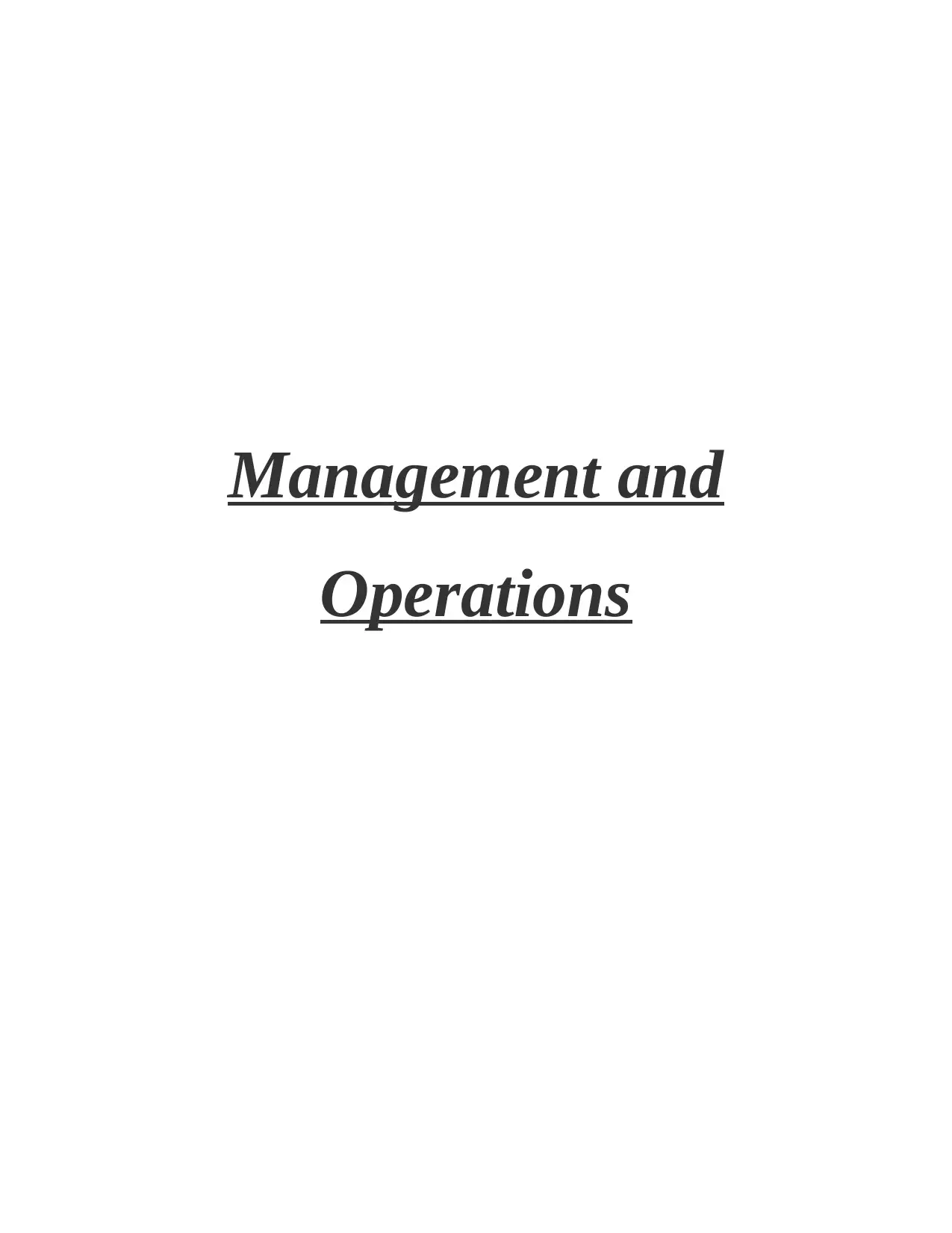
Management and
Operations
Operations
Paraphrase This Document
Need a fresh take? Get an instant paraphrase of this document with our AI Paraphraser
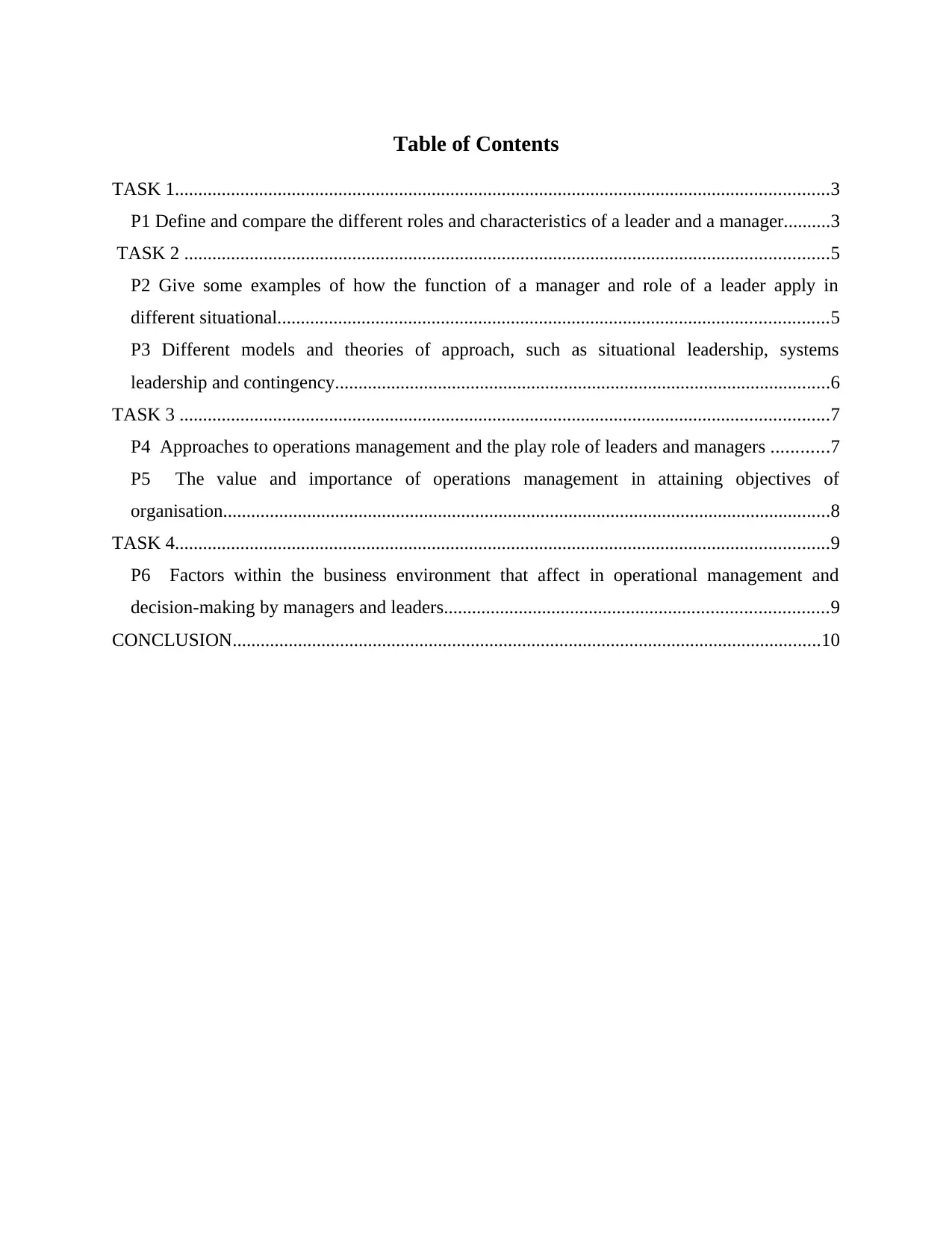
Table of Contents
TASK 1............................................................................................................................................3
P1 Define and compare the different roles and characteristics of a leader and a manager..........3
TASK 2 ..........................................................................................................................................5
P2 Give some examples of how the function of a manager and role of a leader apply in
different situational......................................................................................................................5
P3 Different models and theories of approach, such as situational leadership, systems
leadership and contingency..........................................................................................................6
TASK 3 ...........................................................................................................................................7
P4 Approaches to operations management and the play role of leaders and managers ............7
P5 The value and importance of operations management in attaining objectives of
organisation..................................................................................................................................8
TASK 4............................................................................................................................................9
P6 Factors within the business environment that affect in operational management and
decision-making by managers and leaders..................................................................................9
CONCLUSION..............................................................................................................................10
TASK 1............................................................................................................................................3
P1 Define and compare the different roles and characteristics of a leader and a manager..........3
TASK 2 ..........................................................................................................................................5
P2 Give some examples of how the function of a manager and role of a leader apply in
different situational......................................................................................................................5
P3 Different models and theories of approach, such as situational leadership, systems
leadership and contingency..........................................................................................................6
TASK 3 ...........................................................................................................................................7
P4 Approaches to operations management and the play role of leaders and managers ............7
P5 The value and importance of operations management in attaining objectives of
organisation..................................................................................................................................8
TASK 4............................................................................................................................................9
P6 Factors within the business environment that affect in operational management and
decision-making by managers and leaders..................................................................................9
CONCLUSION..............................................................................................................................10
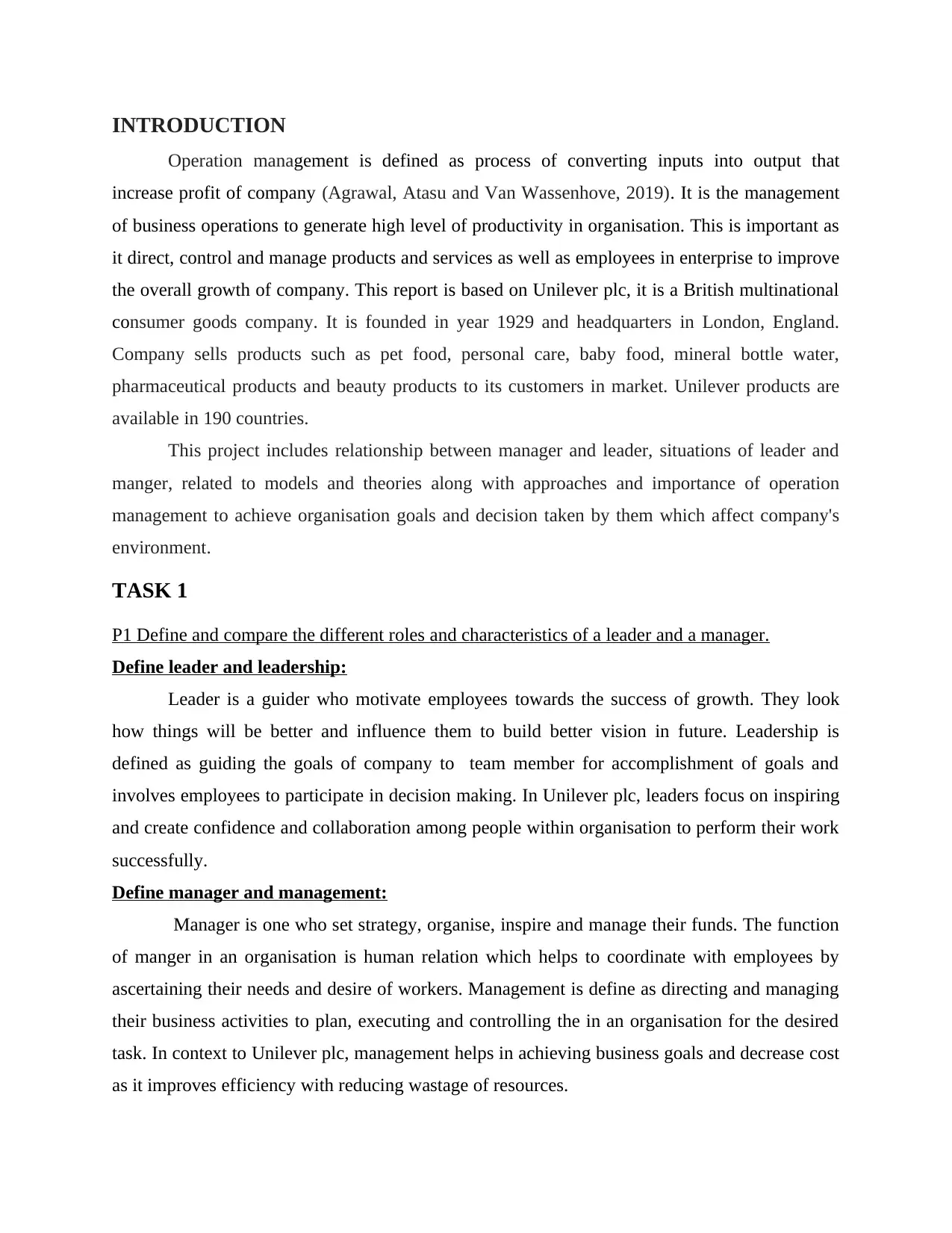
INTRODUCTION
Operation management is defined as process of converting inputs into output that
increase profit of company (Agrawal, Atasu and Van Wassenhove, 2019). It is the management
of business operations to generate high level of productivity in organisation. This is important as
it direct, control and manage products and services as well as employees in enterprise to improve
the overall growth of company. This report is based on Unilever plc, it is a British multinational
consumer goods company. It is founded in year 1929 and headquarters in London, England.
Company sells products such as pet food, personal care, baby food, mineral bottle water,
pharmaceutical products and beauty products to its customers in market. Unilever products are
available in 190 countries.
This project includes relationship between manager and leader, situations of leader and
manger, related to models and theories along with approaches and importance of operation
management to achieve organisation goals and decision taken by them which affect company's
environment.
TASK 1
P1 Define and compare the different roles and characteristics of a leader and a manager.
Define leader and leadership:
Leader is a guider who motivate employees towards the success of growth. They look
how things will be better and influence them to build better vision in future. Leadership is
defined as guiding the goals of company to team member for accomplishment of goals and
involves employees to participate in decision making. In Unilever plc, leaders focus on inspiring
and create confidence and collaboration among people within organisation to perform their work
successfully.
Define manager and management:
Manager is one who set strategy, organise, inspire and manage their funds. The function
of manger in an organisation is human relation which helps to coordinate with employees by
ascertaining their needs and desire of workers. Management is define as directing and managing
their business activities to plan, executing and controlling the in an organisation for the desired
task. In context to Unilever plc, management helps in achieving business goals and decrease cost
as it improves efficiency with reducing wastage of resources.
Operation management is defined as process of converting inputs into output that
increase profit of company (Agrawal, Atasu and Van Wassenhove, 2019). It is the management
of business operations to generate high level of productivity in organisation. This is important as
it direct, control and manage products and services as well as employees in enterprise to improve
the overall growth of company. This report is based on Unilever plc, it is a British multinational
consumer goods company. It is founded in year 1929 and headquarters in London, England.
Company sells products such as pet food, personal care, baby food, mineral bottle water,
pharmaceutical products and beauty products to its customers in market. Unilever products are
available in 190 countries.
This project includes relationship between manager and leader, situations of leader and
manger, related to models and theories along with approaches and importance of operation
management to achieve organisation goals and decision taken by them which affect company's
environment.
TASK 1
P1 Define and compare the different roles and characteristics of a leader and a manager.
Define leader and leadership:
Leader is a guider who motivate employees towards the success of growth. They look
how things will be better and influence them to build better vision in future. Leadership is
defined as guiding the goals of company to team member for accomplishment of goals and
involves employees to participate in decision making. In Unilever plc, leaders focus on inspiring
and create confidence and collaboration among people within organisation to perform their work
successfully.
Define manager and management:
Manager is one who set strategy, organise, inspire and manage their funds. The function
of manger in an organisation is human relation which helps to coordinate with employees by
ascertaining their needs and desire of workers. Management is define as directing and managing
their business activities to plan, executing and controlling the in an organisation for the desired
task. In context to Unilever plc, management helps in achieving business goals and decrease cost
as it improves efficiency with reducing wastage of resources.
⊘ This is a preview!⊘
Do you want full access?
Subscribe today to unlock all pages.

Trusted by 1+ million students worldwide
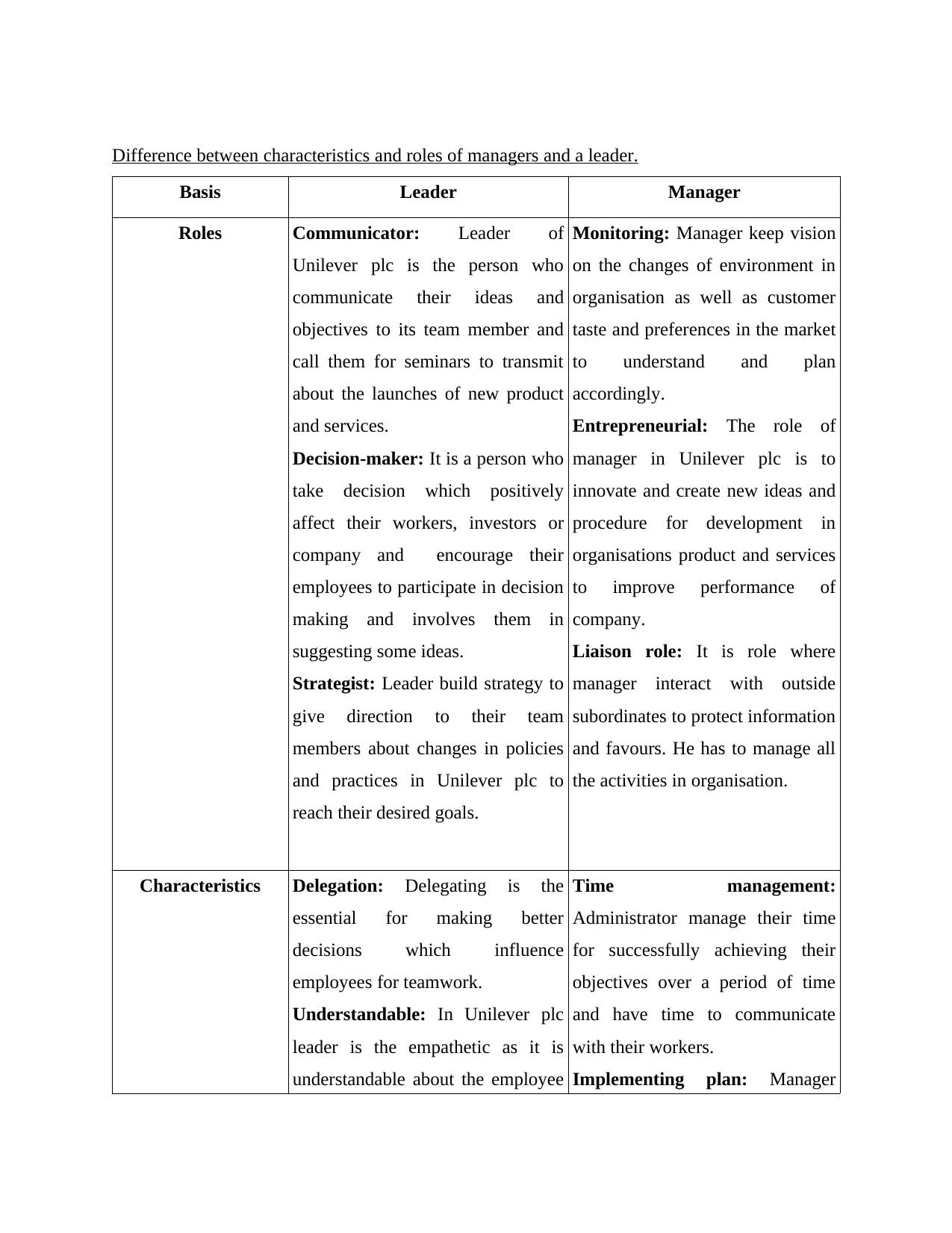
Difference between characteristics and roles of managers and a leader.
Basis Leader Manager
Roles Communicator: Leader of
Unilever plc is the person who
communicate their ideas and
objectives to its team member and
call them for seminars to transmit
about the launches of new product
and services.
Decision-maker: It is a person who
take decision which positively
affect their workers, investors or
company and encourage their
employees to participate in decision
making and involves them in
suggesting some ideas.
Strategist: Leader build strategy to
give direction to their team
members about changes in policies
and practices in Unilever plc to
reach their desired goals.
Monitoring: Manager keep vision
on the changes of environment in
organisation as well as customer
taste and preferences in the market
to understand and plan
accordingly.
Entrepreneurial: The role of
manager in Unilever plc is to
innovate and create new ideas and
procedure for development in
organisations product and services
to improve performance of
company.
Liaison role: It is role where
manager interact with outside
subordinates to protect information
and favours. He has to manage all
the activities in organisation.
Characteristics Delegation: Delegating is the
essential for making better
decisions which influence
employees for teamwork.
Understandable: In Unilever plc
leader is the empathetic as it is
understandable about the employee
Time management:
Administrator manage their time
for successfully achieving their
objectives over a period of time
and have time to communicate
with their workers.
Implementing plan: Manager
Basis Leader Manager
Roles Communicator: Leader of
Unilever plc is the person who
communicate their ideas and
objectives to its team member and
call them for seminars to transmit
about the launches of new product
and services.
Decision-maker: It is a person who
take decision which positively
affect their workers, investors or
company and encourage their
employees to participate in decision
making and involves them in
suggesting some ideas.
Strategist: Leader build strategy to
give direction to their team
members about changes in policies
and practices in Unilever plc to
reach their desired goals.
Monitoring: Manager keep vision
on the changes of environment in
organisation as well as customer
taste and preferences in the market
to understand and plan
accordingly.
Entrepreneurial: The role of
manager in Unilever plc is to
innovate and create new ideas and
procedure for development in
organisations product and services
to improve performance of
company.
Liaison role: It is role where
manager interact with outside
subordinates to protect information
and favours. He has to manage all
the activities in organisation.
Characteristics Delegation: Delegating is the
essential for making better
decisions which influence
employees for teamwork.
Understandable: In Unilever plc
leader is the empathetic as it is
understandable about the employee
Time management:
Administrator manage their time
for successfully achieving their
objectives over a period of time
and have time to communicate
with their workers.
Implementing plan: Manager
Paraphrase This Document
Need a fresh take? Get an instant paraphrase of this document with our AI Paraphraser
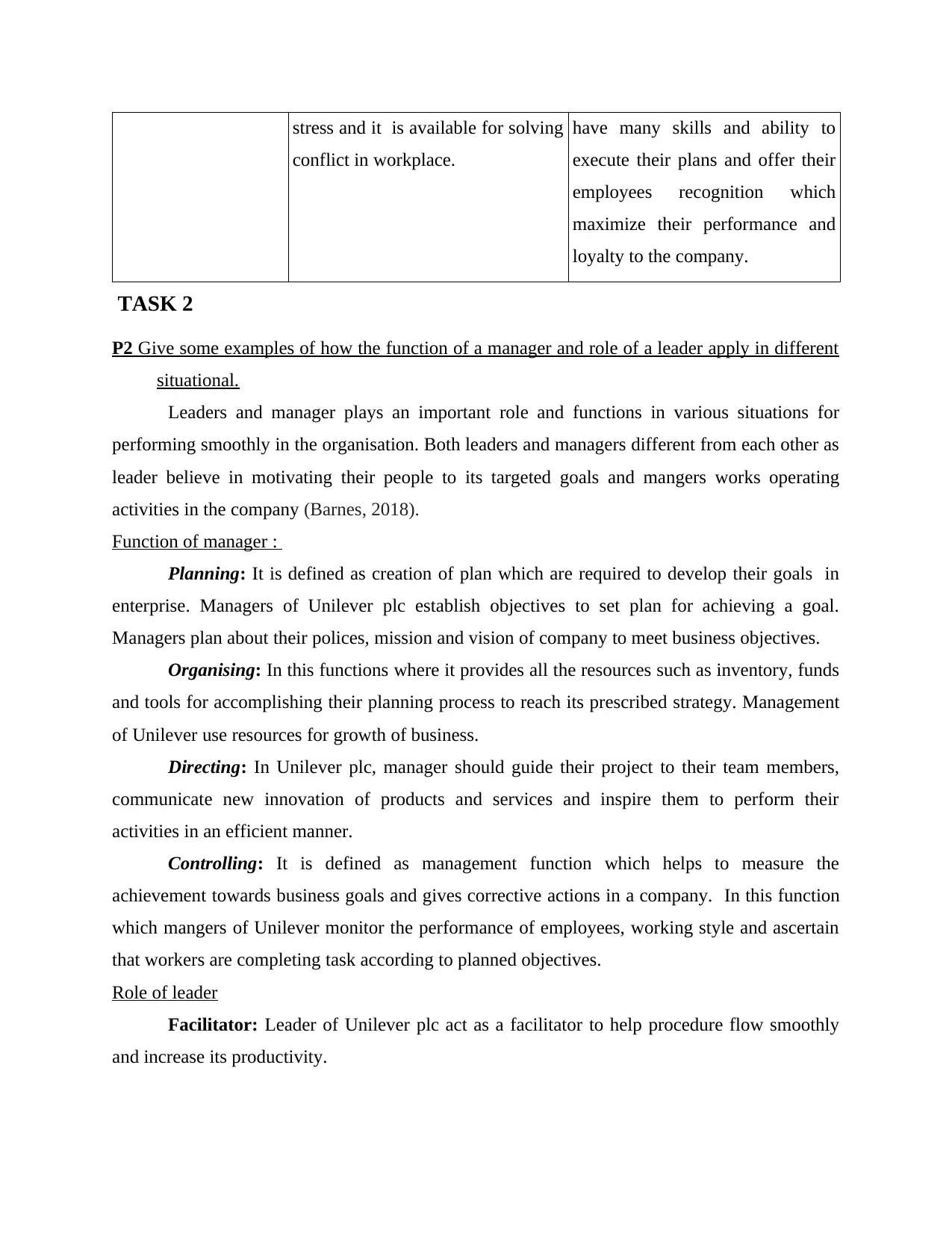
stress and it is available for solving
conflict in workplace.
have many skills and ability to
execute their plans and offer their
employees recognition which
maximize their performance and
loyalty to the company.
TASK 2
P2 Give some examples of how the function of a manager and role of a leader apply in different
situational.
Leaders and manager plays an important role and functions in various situations for
performing smoothly in the organisation. Both leaders and managers different from each other as
leader believe in motivating their people to its targeted goals and mangers works operating
activities in the company (Barnes, 2018).
Function of manager :
Planning: It is defined as creation of plan which are required to develop their goals in
enterprise. Managers of Unilever plc establish objectives to set plan for achieving a goal.
Managers plan about their polices, mission and vision of company to meet business objectives.
Organising: In this functions where it provides all the resources such as inventory, funds
and tools for accomplishing their planning process to reach its prescribed strategy. Management
of Unilever use resources for growth of business.
Directing: In Unilever plc, manager should guide their project to their team members,
communicate new innovation of products and services and inspire them to perform their
activities in an efficient manner.
Controlling: It is defined as management function which helps to measure the
achievement towards business goals and gives corrective actions in a company. In this function
which mangers of Unilever monitor the performance of employees, working style and ascertain
that workers are completing task according to planned objectives.
Role of leader
Facilitator: Leader of Unilever plc act as a facilitator to help procedure flow smoothly
and increase its productivity.
conflict in workplace.
have many skills and ability to
execute their plans and offer their
employees recognition which
maximize their performance and
loyalty to the company.
TASK 2
P2 Give some examples of how the function of a manager and role of a leader apply in different
situational.
Leaders and manager plays an important role and functions in various situations for
performing smoothly in the organisation. Both leaders and managers different from each other as
leader believe in motivating their people to its targeted goals and mangers works operating
activities in the company (Barnes, 2018).
Function of manager :
Planning: It is defined as creation of plan which are required to develop their goals in
enterprise. Managers of Unilever plc establish objectives to set plan for achieving a goal.
Managers plan about their polices, mission and vision of company to meet business objectives.
Organising: In this functions where it provides all the resources such as inventory, funds
and tools for accomplishing their planning process to reach its prescribed strategy. Management
of Unilever use resources for growth of business.
Directing: In Unilever plc, manager should guide their project to their team members,
communicate new innovation of products and services and inspire them to perform their
activities in an efficient manner.
Controlling: It is defined as management function which helps to measure the
achievement towards business goals and gives corrective actions in a company. In this function
which mangers of Unilever monitor the performance of employees, working style and ascertain
that workers are completing task according to planned objectives.
Role of leader
Facilitator: Leader of Unilever plc act as a facilitator to help procedure flow smoothly
and increase its productivity.
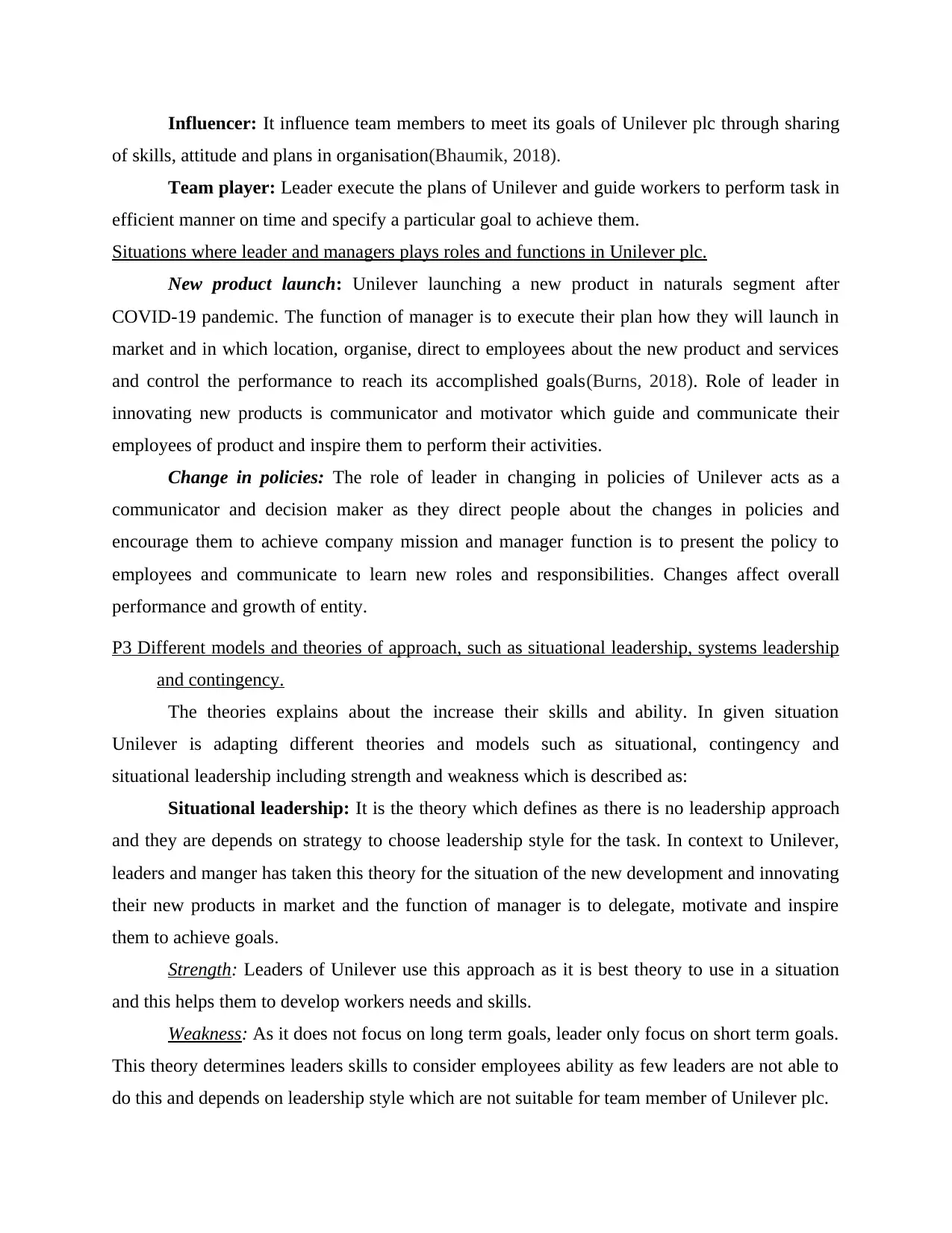
Influencer: It influence team members to meet its goals of Unilever plc through sharing
of skills, attitude and plans in organisation(Bhaumik, 2018).
Team player: Leader execute the plans of Unilever and guide workers to perform task in
efficient manner on time and specify a particular goal to achieve them.
Situations where leader and managers plays roles and functions in Unilever plc.
New product launch: Unilever launching a new product in naturals segment after
COVID-19 pandemic. The function of manager is to execute their plan how they will launch in
market and in which location, organise, direct to employees about the new product and services
and control the performance to reach its accomplished goals(Burns, 2018). Role of leader in
innovating new products is communicator and motivator which guide and communicate their
employees of product and inspire them to perform their activities.
Change in policies: The role of leader in changing in policies of Unilever acts as a
communicator and decision maker as they direct people about the changes in policies and
encourage them to achieve company mission and manager function is to present the policy to
employees and communicate to learn new roles and responsibilities. Changes affect overall
performance and growth of entity.
P3 Different models and theories of approach, such as situational leadership, systems leadership
and contingency.
The theories explains about the increase their skills and ability. In given situation
Unilever is adapting different theories and models such as situational, contingency and
situational leadership including strength and weakness which is described as:
Situational leadership: It is the theory which defines as there is no leadership approach
and they are depends on strategy to choose leadership style for the task. In context to Unilever,
leaders and manger has taken this theory for the situation of the new development and innovating
their new products in market and the function of manager is to delegate, motivate and inspire
them to achieve goals.
Strength: Leaders of Unilever use this approach as it is best theory to use in a situation
and this helps them to develop workers needs and skills.
Weakness: As it does not focus on long term goals, leader only focus on short term goals.
This theory determines leaders skills to consider employees ability as few leaders are not able to
do this and depends on leadership style which are not suitable for team member of Unilever plc.
of skills, attitude and plans in organisation(Bhaumik, 2018).
Team player: Leader execute the plans of Unilever and guide workers to perform task in
efficient manner on time and specify a particular goal to achieve them.
Situations where leader and managers plays roles and functions in Unilever plc.
New product launch: Unilever launching a new product in naturals segment after
COVID-19 pandemic. The function of manager is to execute their plan how they will launch in
market and in which location, organise, direct to employees about the new product and services
and control the performance to reach its accomplished goals(Burns, 2018). Role of leader in
innovating new products is communicator and motivator which guide and communicate their
employees of product and inspire them to perform their activities.
Change in policies: The role of leader in changing in policies of Unilever acts as a
communicator and decision maker as they direct people about the changes in policies and
encourage them to achieve company mission and manager function is to present the policy to
employees and communicate to learn new roles and responsibilities. Changes affect overall
performance and growth of entity.
P3 Different models and theories of approach, such as situational leadership, systems leadership
and contingency.
The theories explains about the increase their skills and ability. In given situation
Unilever is adapting different theories and models such as situational, contingency and
situational leadership including strength and weakness which is described as:
Situational leadership: It is the theory which defines as there is no leadership approach
and they are depends on strategy to choose leadership style for the task. In context to Unilever,
leaders and manger has taken this theory for the situation of the new development and innovating
their new products in market and the function of manager is to delegate, motivate and inspire
them to achieve goals.
Strength: Leaders of Unilever use this approach as it is best theory to use in a situation
and this helps them to develop workers needs and skills.
Weakness: As it does not focus on long term goals, leader only focus on short term goals.
This theory determines leaders skills to consider employees ability as few leaders are not able to
do this and depends on leadership style which are not suitable for team member of Unilever plc.
⊘ This is a preview!⊘
Do you want full access?
Subscribe today to unlock all pages.

Trusted by 1+ million students worldwide
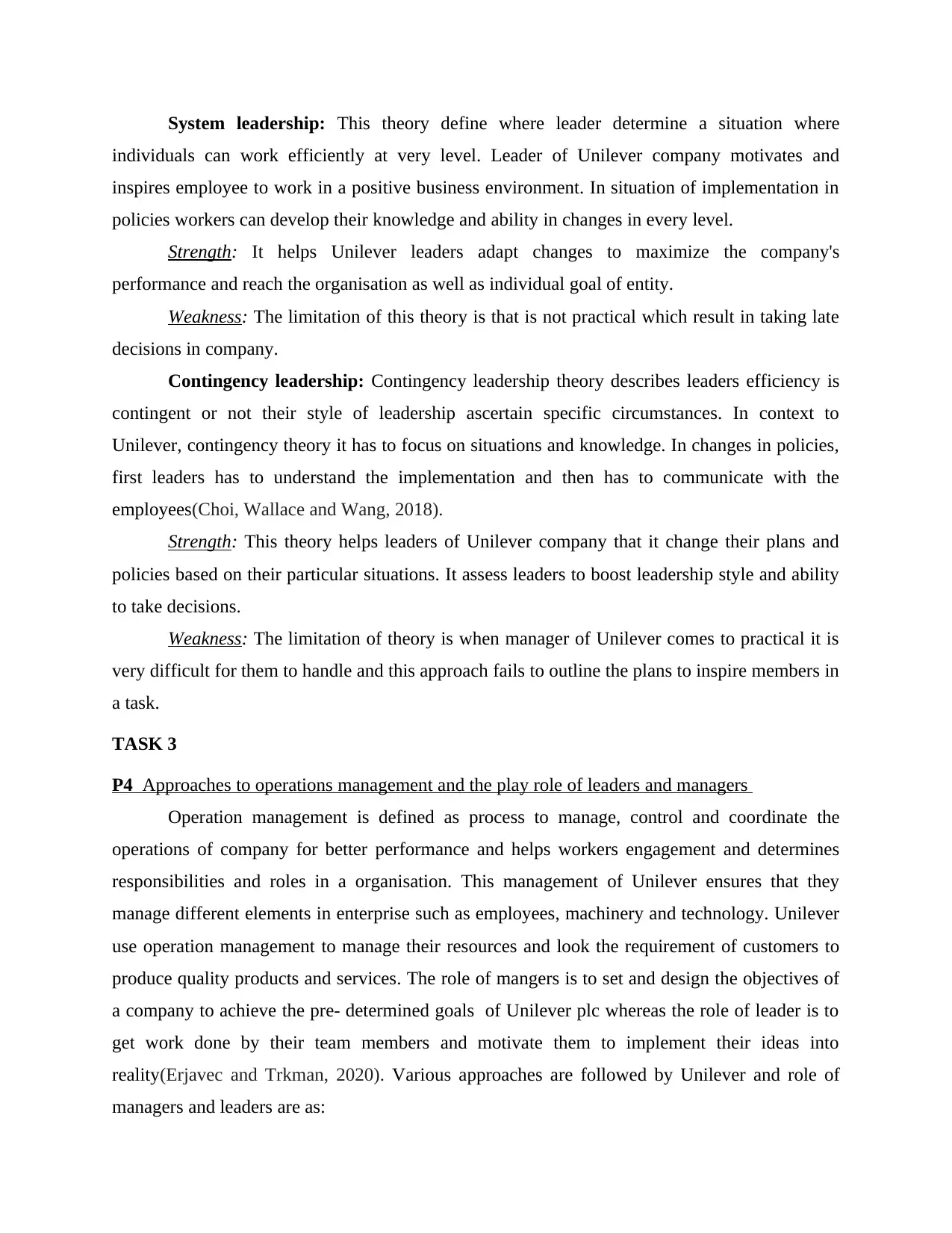
System leadership: This theory define where leader determine a situation where
individuals can work efficiently at very level. Leader of Unilever company motivates and
inspires employee to work in a positive business environment. In situation of implementation in
policies workers can develop their knowledge and ability in changes in every level.
Strength: It helps Unilever leaders adapt changes to maximize the company's
performance and reach the organisation as well as individual goal of entity.
Weakness: The limitation of this theory is that is not practical which result in taking late
decisions in company.
Contingency leadership: Contingency leadership theory describes leaders efficiency is
contingent or not their style of leadership ascertain specific circumstances. In context to
Unilever, contingency theory it has to focus on situations and knowledge. In changes in policies,
first leaders has to understand the implementation and then has to communicate with the
employees(Choi, Wallace and Wang, 2018).
Strength: This theory helps leaders of Unilever company that it change their plans and
policies based on their particular situations. It assess leaders to boost leadership style and ability
to take decisions.
Weakness: The limitation of theory is when manager of Unilever comes to practical it is
very difficult for them to handle and this approach fails to outline the plans to inspire members in
a task.
TASK 3
P4 Approaches to operations management and the play role of leaders and managers
Operation management is defined as process to manage, control and coordinate the
operations of company for better performance and helps workers engagement and determines
responsibilities and roles in a organisation. This management of Unilever ensures that they
manage different elements in enterprise such as employees, machinery and technology. Unilever
use operation management to manage their resources and look the requirement of customers to
produce quality products and services. The role of mangers is to set and design the objectives of
a company to achieve the pre- determined goals of Unilever plc whereas the role of leader is to
get work done by their team members and motivate them to implement their ideas into
reality(Erjavec and Trkman, 2020). Various approaches are followed by Unilever and role of
managers and leaders are as:
individuals can work efficiently at very level. Leader of Unilever company motivates and
inspires employee to work in a positive business environment. In situation of implementation in
policies workers can develop their knowledge and ability in changes in every level.
Strength: It helps Unilever leaders adapt changes to maximize the company's
performance and reach the organisation as well as individual goal of entity.
Weakness: The limitation of this theory is that is not practical which result in taking late
decisions in company.
Contingency leadership: Contingency leadership theory describes leaders efficiency is
contingent or not their style of leadership ascertain specific circumstances. In context to
Unilever, contingency theory it has to focus on situations and knowledge. In changes in policies,
first leaders has to understand the implementation and then has to communicate with the
employees(Choi, Wallace and Wang, 2018).
Strength: This theory helps leaders of Unilever company that it change their plans and
policies based on their particular situations. It assess leaders to boost leadership style and ability
to take decisions.
Weakness: The limitation of theory is when manager of Unilever comes to practical it is
very difficult for them to handle and this approach fails to outline the plans to inspire members in
a task.
TASK 3
P4 Approaches to operations management and the play role of leaders and managers
Operation management is defined as process to manage, control and coordinate the
operations of company for better performance and helps workers engagement and determines
responsibilities and roles in a organisation. This management of Unilever ensures that they
manage different elements in enterprise such as employees, machinery and technology. Unilever
use operation management to manage their resources and look the requirement of customers to
produce quality products and services. The role of mangers is to set and design the objectives of
a company to achieve the pre- determined goals of Unilever plc whereas the role of leader is to
get work done by their team members and motivate them to implement their ideas into
reality(Erjavec and Trkman, 2020). Various approaches are followed by Unilever and role of
managers and leaders are as:
Paraphrase This Document
Need a fresh take? Get an instant paraphrase of this document with our AI Paraphraser
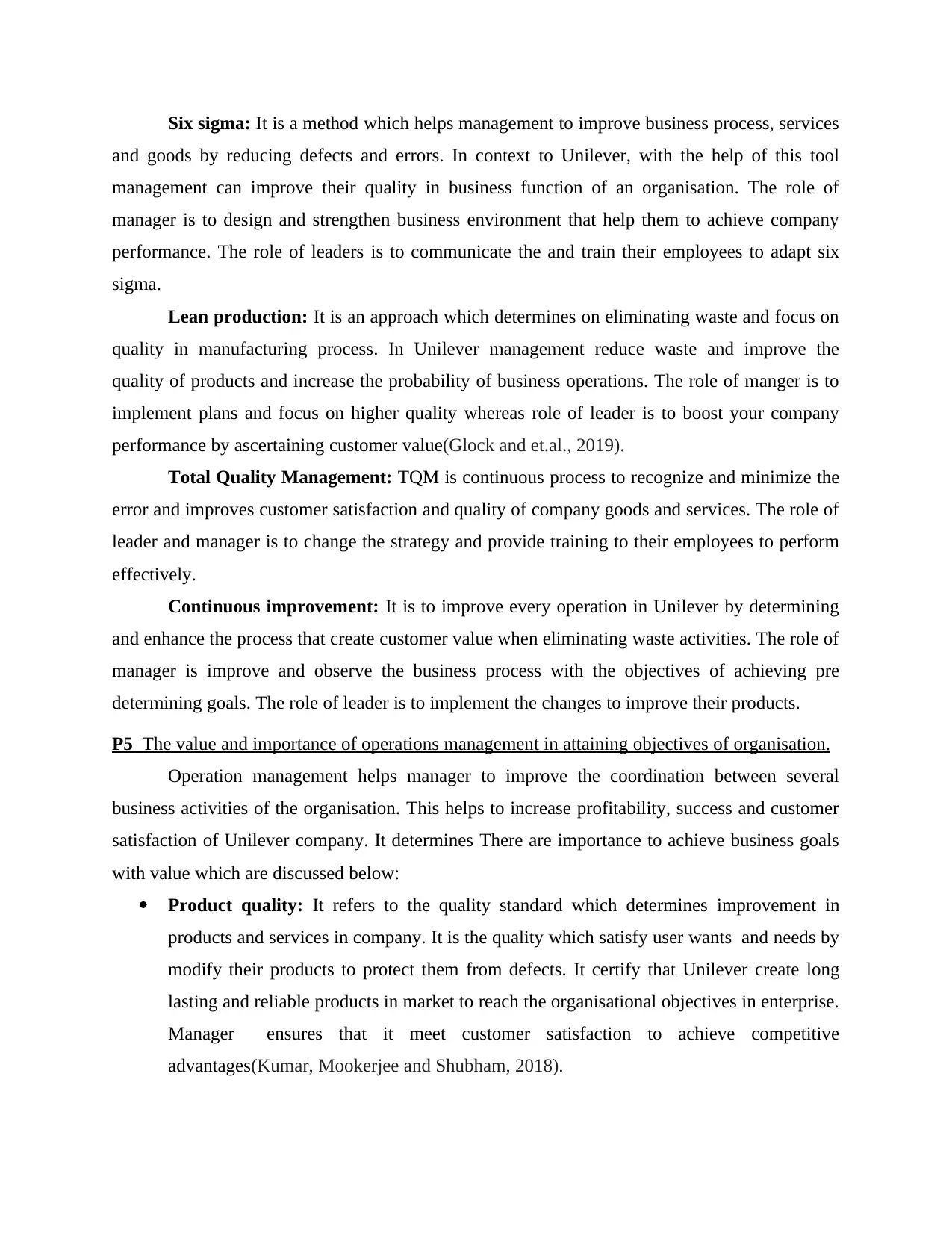
Six sigma: It is a method which helps management to improve business process, services
and goods by reducing defects and errors. In context to Unilever, with the help of this tool
management can improve their quality in business function of an organisation. The role of
manager is to design and strengthen business environment that help them to achieve company
performance. The role of leaders is to communicate the and train their employees to adapt six
sigma.
Lean production: It is an approach which determines on eliminating waste and focus on
quality in manufacturing process. In Unilever management reduce waste and improve the
quality of products and increase the probability of business operations. The role of manger is to
implement plans and focus on higher quality whereas role of leader is to boost your company
performance by ascertaining customer value(Glock and et.al., 2019).
Total Quality Management: TQM is continuous process to recognize and minimize the
error and improves customer satisfaction and quality of company goods and services. The role of
leader and manager is to change the strategy and provide training to their employees to perform
effectively.
Continuous improvement: It is to improve every operation in Unilever by determining
and enhance the process that create customer value when eliminating waste activities. The role of
manager is improve and observe the business process with the objectives of achieving pre
determining goals. The role of leader is to implement the changes to improve their products.
P5 The value and importance of operations management in attaining objectives of organisation.
Operation management helps manager to improve the coordination between several
business activities of the organisation. This helps to increase profitability, success and customer
satisfaction of Unilever company. It determines There are importance to achieve business goals
with value which are discussed below:
Product quality: It refers to the quality standard which determines improvement in
products and services in company. It is the quality which satisfy user wants and needs by
modify their products to protect them from defects. It certify that Unilever create long
lasting and reliable products in market to reach the organisational objectives in enterprise.
Manager ensures that it meet customer satisfaction to achieve competitive
advantages(Kumar, Mookerjee and Shubham, 2018).
and goods by reducing defects and errors. In context to Unilever, with the help of this tool
management can improve their quality in business function of an organisation. The role of
manager is to design and strengthen business environment that help them to achieve company
performance. The role of leaders is to communicate the and train their employees to adapt six
sigma.
Lean production: It is an approach which determines on eliminating waste and focus on
quality in manufacturing process. In Unilever management reduce waste and improve the
quality of products and increase the probability of business operations. The role of manger is to
implement plans and focus on higher quality whereas role of leader is to boost your company
performance by ascertaining customer value(Glock and et.al., 2019).
Total Quality Management: TQM is continuous process to recognize and minimize the
error and improves customer satisfaction and quality of company goods and services. The role of
leader and manager is to change the strategy and provide training to their employees to perform
effectively.
Continuous improvement: It is to improve every operation in Unilever by determining
and enhance the process that create customer value when eliminating waste activities. The role of
manager is improve and observe the business process with the objectives of achieving pre
determining goals. The role of leader is to implement the changes to improve their products.
P5 The value and importance of operations management in attaining objectives of organisation.
Operation management helps manager to improve the coordination between several
business activities of the organisation. This helps to increase profitability, success and customer
satisfaction of Unilever company. It determines There are importance to achieve business goals
with value which are discussed below:
Product quality: It refers to the quality standard which determines improvement in
products and services in company. It is the quality which satisfy user wants and needs by
modify their products to protect them from defects. It certify that Unilever create long
lasting and reliable products in market to reach the organisational objectives in enterprise.
Manager ensures that it meet customer satisfaction to achieve competitive
advantages(Kumar, Mookerjee and Shubham, 2018).
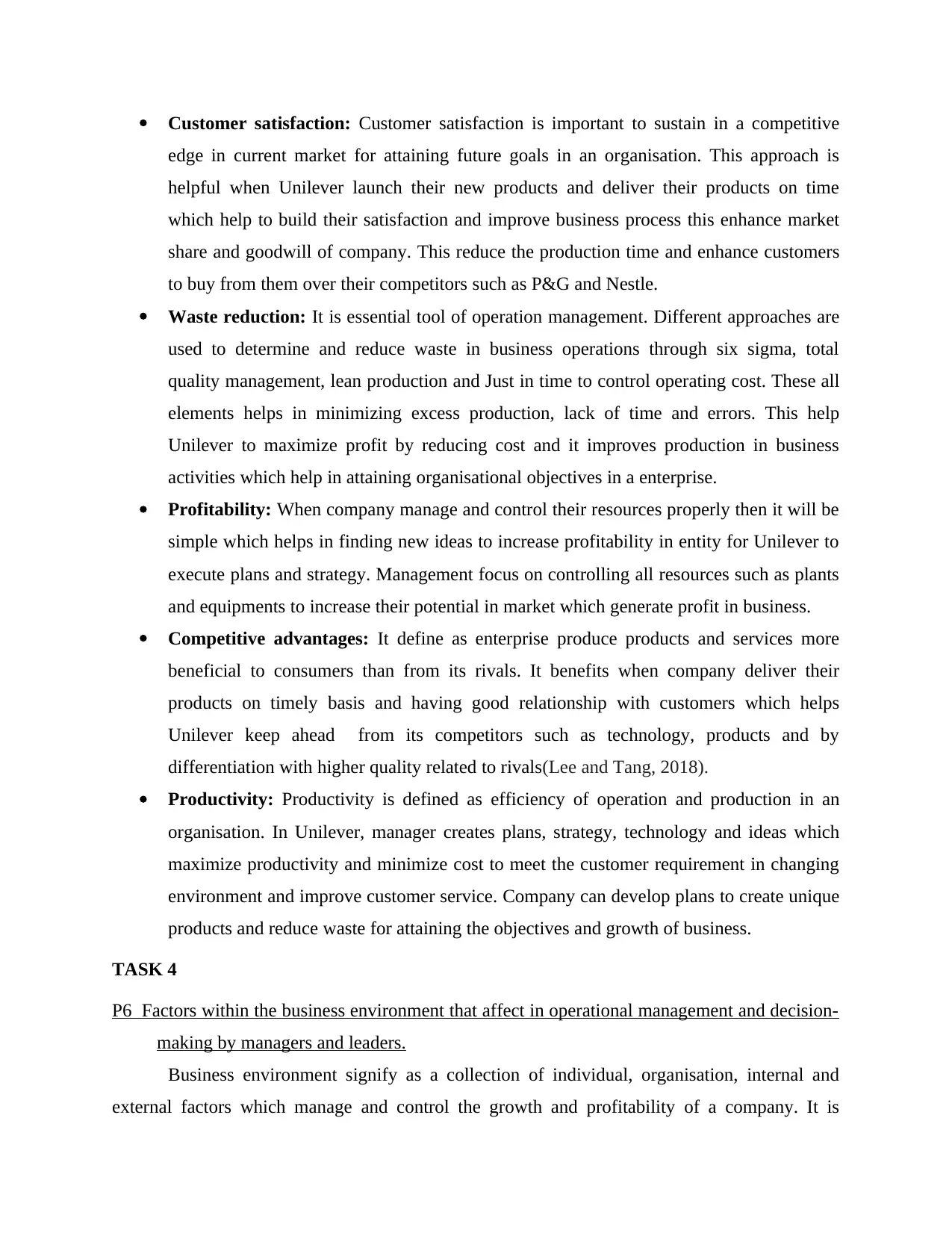
Customer satisfaction: Customer satisfaction is important to sustain in a competitive
edge in current market for attaining future goals in an organisation. This approach is
helpful when Unilever launch their new products and deliver their products on time
which help to build their satisfaction and improve business process this enhance market
share and goodwill of company. This reduce the production time and enhance customers
to buy from them over their competitors such as P&G and Nestle.
Waste reduction: It is essential tool of operation management. Different approaches are
used to determine and reduce waste in business operations through six sigma, total
quality management, lean production and Just in time to control operating cost. These all
elements helps in minimizing excess production, lack of time and errors. This help
Unilever to maximize profit by reducing cost and it improves production in business
activities which help in attaining organisational objectives in a enterprise.
Profitability: When company manage and control their resources properly then it will be
simple which helps in finding new ideas to increase profitability in entity for Unilever to
execute plans and strategy. Management focus on controlling all resources such as plants
and equipments to increase their potential in market which generate profit in business.
Competitive advantages: It define as enterprise produce products and services more
beneficial to consumers than from its rivals. It benefits when company deliver their
products on timely basis and having good relationship with customers which helps
Unilever keep ahead from its competitors such as technology, products and by
differentiation with higher quality related to rivals(Lee and Tang, 2018).
Productivity: Productivity is defined as efficiency of operation and production in an
organisation. In Unilever, manager creates plans, strategy, technology and ideas which
maximize productivity and minimize cost to meet the customer requirement in changing
environment and improve customer service. Company can develop plans to create unique
products and reduce waste for attaining the objectives and growth of business.
TASK 4
P6 Factors within the business environment that affect in operational management and decision-
making by managers and leaders.
Business environment signify as a collection of individual, organisation, internal and
external factors which manage and control the growth and profitability of a company. It is
edge in current market for attaining future goals in an organisation. This approach is
helpful when Unilever launch their new products and deliver their products on time
which help to build their satisfaction and improve business process this enhance market
share and goodwill of company. This reduce the production time and enhance customers
to buy from them over their competitors such as P&G and Nestle.
Waste reduction: It is essential tool of operation management. Different approaches are
used to determine and reduce waste in business operations through six sigma, total
quality management, lean production and Just in time to control operating cost. These all
elements helps in minimizing excess production, lack of time and errors. This help
Unilever to maximize profit by reducing cost and it improves production in business
activities which help in attaining organisational objectives in a enterprise.
Profitability: When company manage and control their resources properly then it will be
simple which helps in finding new ideas to increase profitability in entity for Unilever to
execute plans and strategy. Management focus on controlling all resources such as plants
and equipments to increase their potential in market which generate profit in business.
Competitive advantages: It define as enterprise produce products and services more
beneficial to consumers than from its rivals. It benefits when company deliver their
products on timely basis and having good relationship with customers which helps
Unilever keep ahead from its competitors such as technology, products and by
differentiation with higher quality related to rivals(Lee and Tang, 2018).
Productivity: Productivity is defined as efficiency of operation and production in an
organisation. In Unilever, manager creates plans, strategy, technology and ideas which
maximize productivity and minimize cost to meet the customer requirement in changing
environment and improve customer service. Company can develop plans to create unique
products and reduce waste for attaining the objectives and growth of business.
TASK 4
P6 Factors within the business environment that affect in operational management and decision-
making by managers and leaders.
Business environment signify as a collection of individual, organisation, internal and
external factors which manage and control the growth and profitability of a company. It is
⊘ This is a preview!⊘
Do you want full access?
Subscribe today to unlock all pages.

Trusted by 1+ million students worldwide
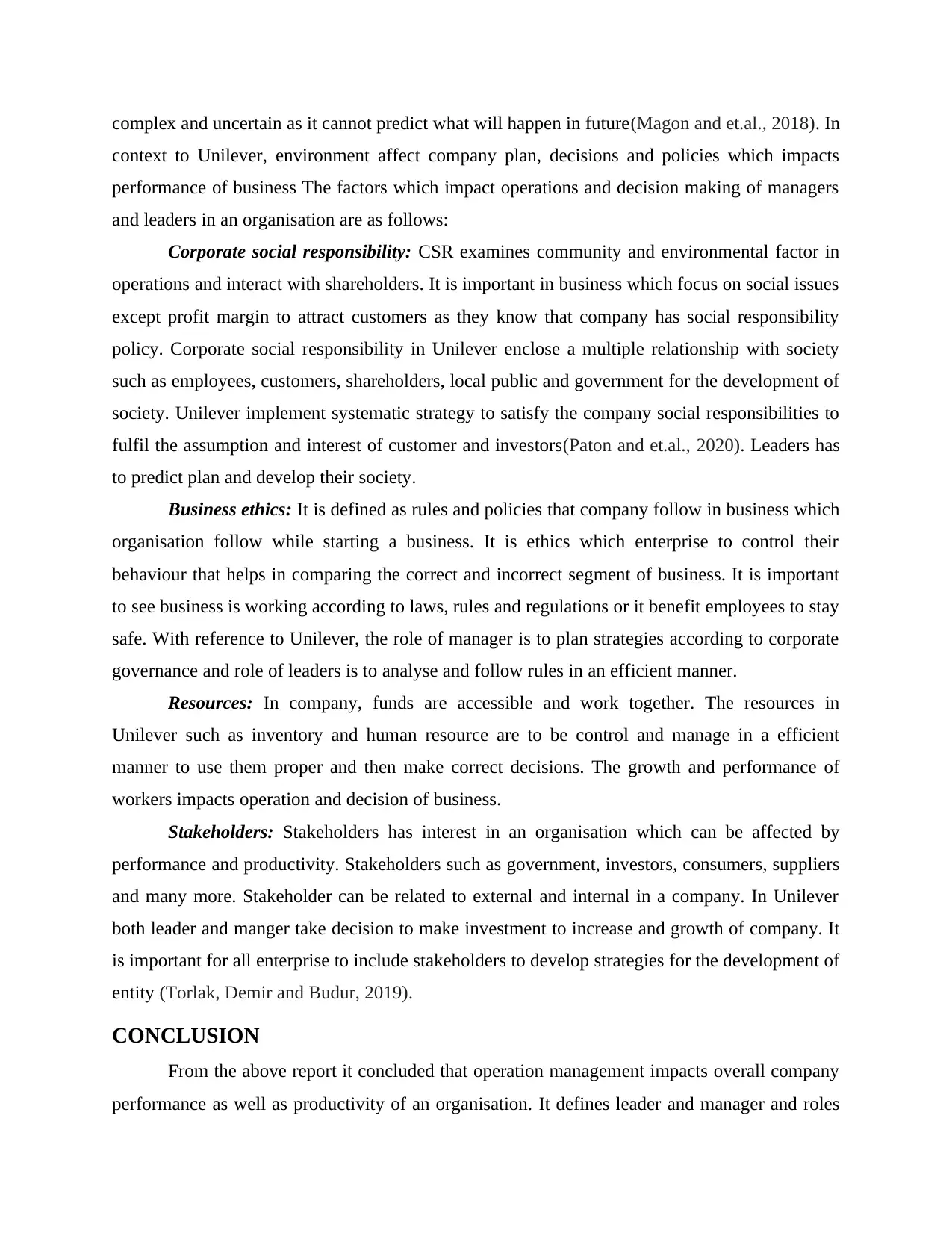
complex and uncertain as it cannot predict what will happen in future(Magon and et.al., 2018). In
context to Unilever, environment affect company plan, decisions and policies which impacts
performance of business The factors which impact operations and decision making of managers
and leaders in an organisation are as follows:
Corporate social responsibility: CSR examines community and environmental factor in
operations and interact with shareholders. It is important in business which focus on social issues
except profit margin to attract customers as they know that company has social responsibility
policy. Corporate social responsibility in Unilever enclose a multiple relationship with society
such as employees, customers, shareholders, local public and government for the development of
society. Unilever implement systematic strategy to satisfy the company social responsibilities to
fulfil the assumption and interest of customer and investors(Paton and et.al., 2020). Leaders has
to predict plan and develop their society.
Business ethics: It is defined as rules and policies that company follow in business which
organisation follow while starting a business. It is ethics which enterprise to control their
behaviour that helps in comparing the correct and incorrect segment of business. It is important
to see business is working according to laws, rules and regulations or it benefit employees to stay
safe. With reference to Unilever, the role of manager is to plan strategies according to corporate
governance and role of leaders is to analyse and follow rules in an efficient manner.
Resources: In company, funds are accessible and work together. The resources in
Unilever such as inventory and human resource are to be control and manage in a efficient
manner to use them proper and then make correct decisions. The growth and performance of
workers impacts operation and decision of business.
Stakeholders: Stakeholders has interest in an organisation which can be affected by
performance and productivity. Stakeholders such as government, investors, consumers, suppliers
and many more. Stakeholder can be related to external and internal in a company. In Unilever
both leader and manger take decision to make investment to increase and growth of company. It
is important for all enterprise to include stakeholders to develop strategies for the development of
entity (Torlak, Demir and Budur, 2019).
CONCLUSION
From the above report it concluded that operation management impacts overall company
performance as well as productivity of an organisation. It defines leader and manager and roles
context to Unilever, environment affect company plan, decisions and policies which impacts
performance of business The factors which impact operations and decision making of managers
and leaders in an organisation are as follows:
Corporate social responsibility: CSR examines community and environmental factor in
operations and interact with shareholders. It is important in business which focus on social issues
except profit margin to attract customers as they know that company has social responsibility
policy. Corporate social responsibility in Unilever enclose a multiple relationship with society
such as employees, customers, shareholders, local public and government for the development of
society. Unilever implement systematic strategy to satisfy the company social responsibilities to
fulfil the assumption and interest of customer and investors(Paton and et.al., 2020). Leaders has
to predict plan and develop their society.
Business ethics: It is defined as rules and policies that company follow in business which
organisation follow while starting a business. It is ethics which enterprise to control their
behaviour that helps in comparing the correct and incorrect segment of business. It is important
to see business is working according to laws, rules and regulations or it benefit employees to stay
safe. With reference to Unilever, the role of manager is to plan strategies according to corporate
governance and role of leaders is to analyse and follow rules in an efficient manner.
Resources: In company, funds are accessible and work together. The resources in
Unilever such as inventory and human resource are to be control and manage in a efficient
manner to use them proper and then make correct decisions. The growth and performance of
workers impacts operation and decision of business.
Stakeholders: Stakeholders has interest in an organisation which can be affected by
performance and productivity. Stakeholders such as government, investors, consumers, suppliers
and many more. Stakeholder can be related to external and internal in a company. In Unilever
both leader and manger take decision to make investment to increase and growth of company. It
is important for all enterprise to include stakeholders to develop strategies for the development of
entity (Torlak, Demir and Budur, 2019).
CONCLUSION
From the above report it concluded that operation management impacts overall company
performance as well as productivity of an organisation. It defines leader and manager and roles
Paraphrase This Document
Need a fresh take? Get an instant paraphrase of this document with our AI Paraphraser
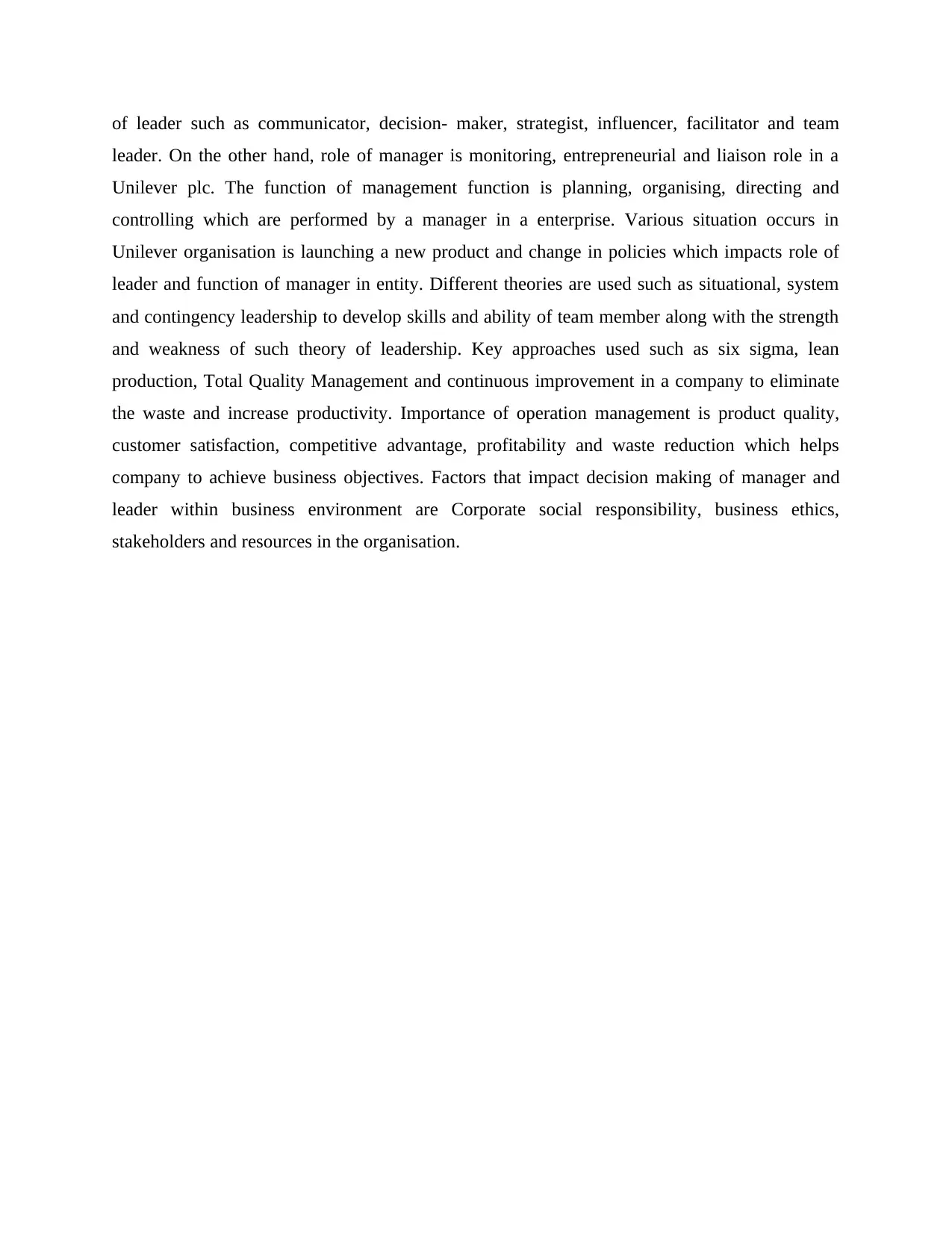
of leader such as communicator, decision- maker, strategist, influencer, facilitator and team
leader. On the other hand, role of manager is monitoring, entrepreneurial and liaison role in a
Unilever plc. The function of management function is planning, organising, directing and
controlling which are performed by a manager in a enterprise. Various situation occurs in
Unilever organisation is launching a new product and change in policies which impacts role of
leader and function of manager in entity. Different theories are used such as situational, system
and contingency leadership to develop skills and ability of team member along with the strength
and weakness of such theory of leadership. Key approaches used such as six sigma, lean
production, Total Quality Management and continuous improvement in a company to eliminate
the waste and increase productivity. Importance of operation management is product quality,
customer satisfaction, competitive advantage, profitability and waste reduction which helps
company to achieve business objectives. Factors that impact decision making of manager and
leader within business environment are Corporate social responsibility, business ethics,
stakeholders and resources in the organisation.
leader. On the other hand, role of manager is monitoring, entrepreneurial and liaison role in a
Unilever plc. The function of management function is planning, organising, directing and
controlling which are performed by a manager in a enterprise. Various situation occurs in
Unilever organisation is launching a new product and change in policies which impacts role of
leader and function of manager in entity. Different theories are used such as situational, system
and contingency leadership to develop skills and ability of team member along with the strength
and weakness of such theory of leadership. Key approaches used such as six sigma, lean
production, Total Quality Management and continuous improvement in a company to eliminate
the waste and increase productivity. Importance of operation management is product quality,
customer satisfaction, competitive advantage, profitability and waste reduction which helps
company to achieve business objectives. Factors that impact decision making of manager and
leader within business environment are Corporate social responsibility, business ethics,
stakeholders and resources in the organisation.
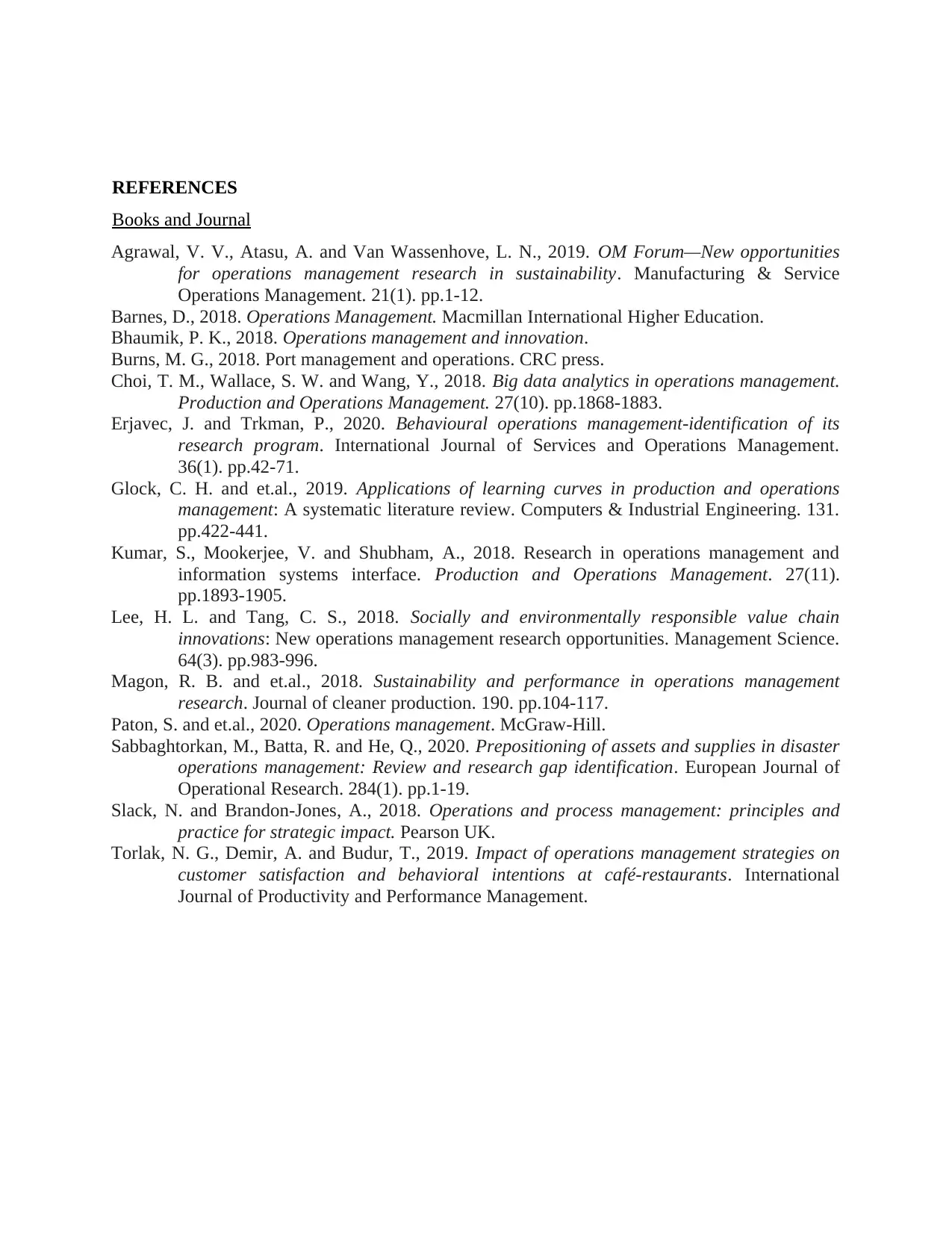
REFERENCES
Books and Journal
Agrawal, V. V., Atasu, A. and Van Wassenhove, L. N., 2019. OM Forum—New opportunities
for operations management research in sustainability. Manufacturing & Service
Operations Management. 21(1). pp.1-12.
Barnes, D., 2018. Operations Management. Macmillan International Higher Education.
Bhaumik, P. K., 2018. Operations management and innovation.
Burns, M. G., 2018. Port management and operations. CRC press.
Choi, T. M., Wallace, S. W. and Wang, Y., 2018. Big data analytics in operations management.
Production and Operations Management. 27(10). pp.1868-1883.
Erjavec, J. and Trkman, P., 2020. Behavioural operations management-identification of its
research program. International Journal of Services and Operations Management.
36(1). pp.42-71.
Glock, C. H. and et.al., 2019. Applications of learning curves in production and operations
management: A systematic literature review. Computers & Industrial Engineering. 131.
pp.422-441.
Kumar, S., Mookerjee, V. and Shubham, A., 2018. Research in operations management and
information systems interface. Production and Operations Management. 27(11).
pp.1893-1905.
Lee, H. L. and Tang, C. S., 2018. Socially and environmentally responsible value chain
innovations: New operations management research opportunities. Management Science.
64(3). pp.983-996.
Magon, R. B. and et.al., 2018. Sustainability and performance in operations management
research. Journal of cleaner production. 190. pp.104-117.
Paton, S. and et.al., 2020. Operations management. McGraw-Hill.
Sabbaghtorkan, M., Batta, R. and He, Q., 2020. Prepositioning of assets and supplies in disaster
operations management: Review and research gap identification. European Journal of
Operational Research. 284(1). pp.1-19.
Slack, N. and Brandon-Jones, A., 2018. Operations and process management: principles and
practice for strategic impact. Pearson UK.
Torlak, N. G., Demir, A. and Budur, T., 2019. Impact of operations management strategies on
customer satisfaction and behavioral intentions at café-restaurants. International
Journal of Productivity and Performance Management.
Books and Journal
Agrawal, V. V., Atasu, A. and Van Wassenhove, L. N., 2019. OM Forum—New opportunities
for operations management research in sustainability. Manufacturing & Service
Operations Management. 21(1). pp.1-12.
Barnes, D., 2018. Operations Management. Macmillan International Higher Education.
Bhaumik, P. K., 2018. Operations management and innovation.
Burns, M. G., 2018. Port management and operations. CRC press.
Choi, T. M., Wallace, S. W. and Wang, Y., 2018. Big data analytics in operations management.
Production and Operations Management. 27(10). pp.1868-1883.
Erjavec, J. and Trkman, P., 2020. Behavioural operations management-identification of its
research program. International Journal of Services and Operations Management.
36(1). pp.42-71.
Glock, C. H. and et.al., 2019. Applications of learning curves in production and operations
management: A systematic literature review. Computers & Industrial Engineering. 131.
pp.422-441.
Kumar, S., Mookerjee, V. and Shubham, A., 2018. Research in operations management and
information systems interface. Production and Operations Management. 27(11).
pp.1893-1905.
Lee, H. L. and Tang, C. S., 2018. Socially and environmentally responsible value chain
innovations: New operations management research opportunities. Management Science.
64(3). pp.983-996.
Magon, R. B. and et.al., 2018. Sustainability and performance in operations management
research. Journal of cleaner production. 190. pp.104-117.
Paton, S. and et.al., 2020. Operations management. McGraw-Hill.
Sabbaghtorkan, M., Batta, R. and He, Q., 2020. Prepositioning of assets and supplies in disaster
operations management: Review and research gap identification. European Journal of
Operational Research. 284(1). pp.1-19.
Slack, N. and Brandon-Jones, A., 2018. Operations and process management: principles and
practice for strategic impact. Pearson UK.
Torlak, N. G., Demir, A. and Budur, T., 2019. Impact of operations management strategies on
customer satisfaction and behavioral intentions at café-restaurants. International
Journal of Productivity and Performance Management.
⊘ This is a preview!⊘
Do you want full access?
Subscribe today to unlock all pages.

Trusted by 1+ million students worldwide
1 out of 12
Related Documents
Your All-in-One AI-Powered Toolkit for Academic Success.
+13062052269
info@desklib.com
Available 24*7 on WhatsApp / Email
![[object Object]](/_next/static/media/star-bottom.7253800d.svg)
Unlock your academic potential
Copyright © 2020–2026 A2Z Services. All Rights Reserved. Developed and managed by ZUCOL.





